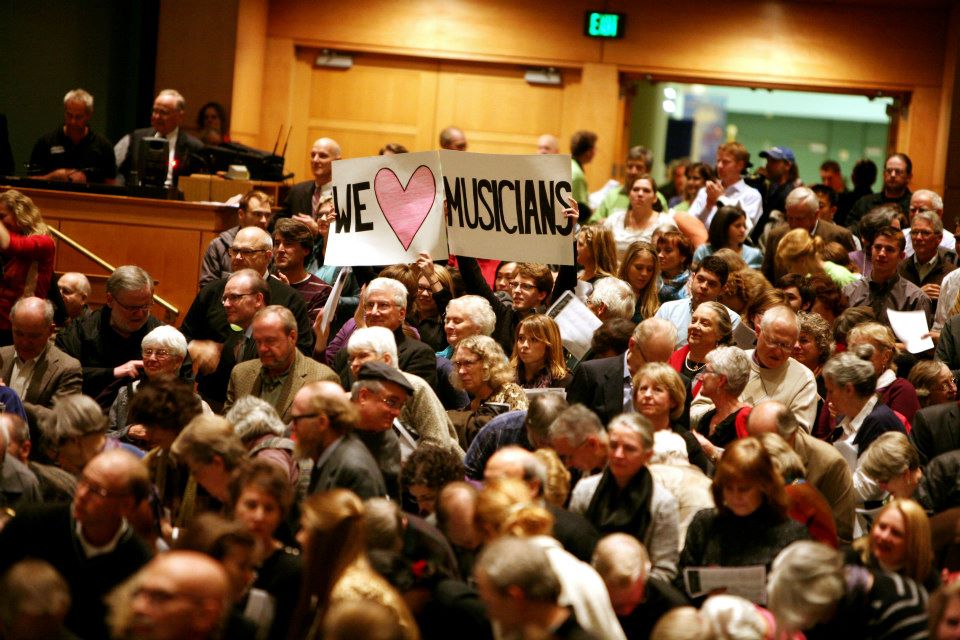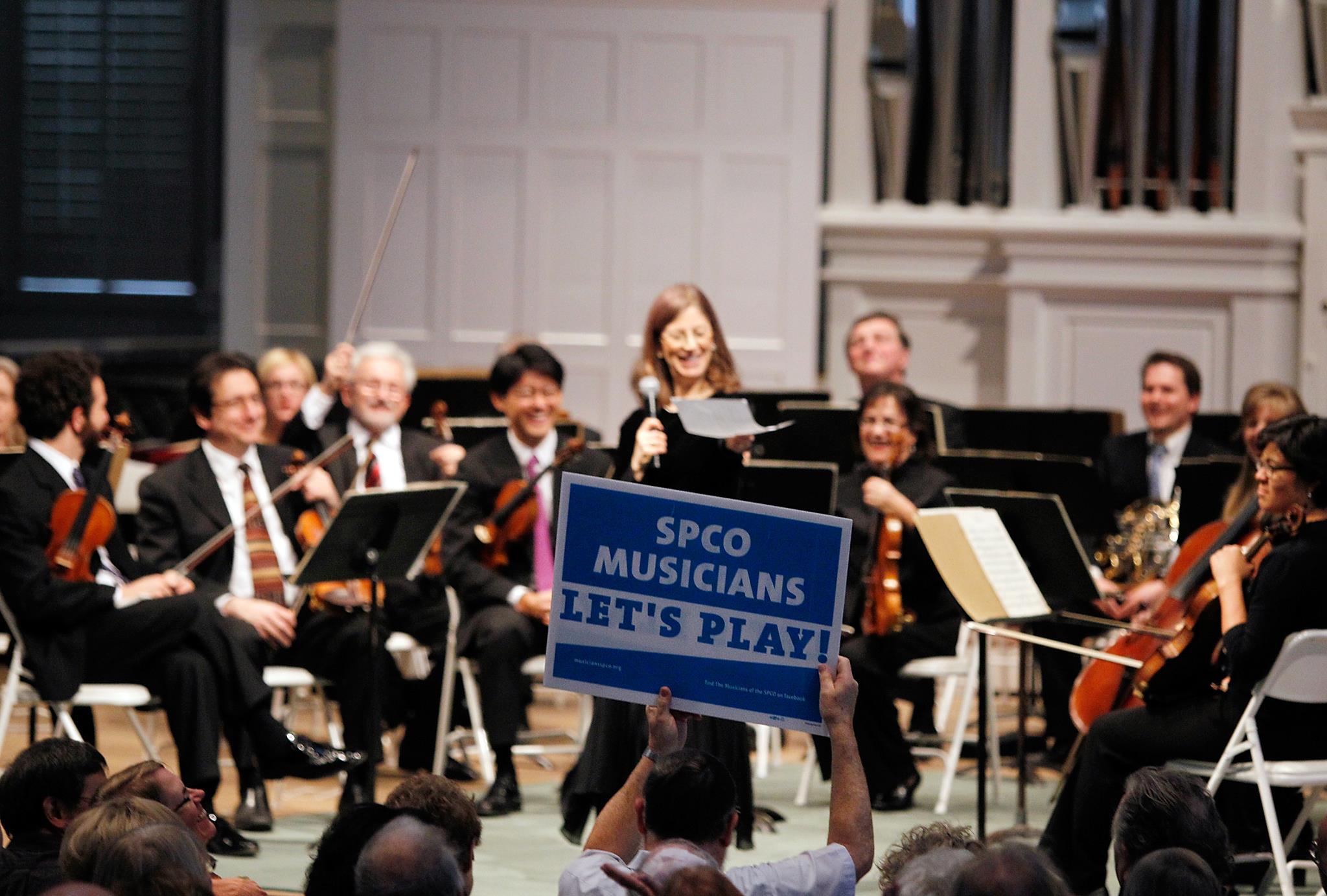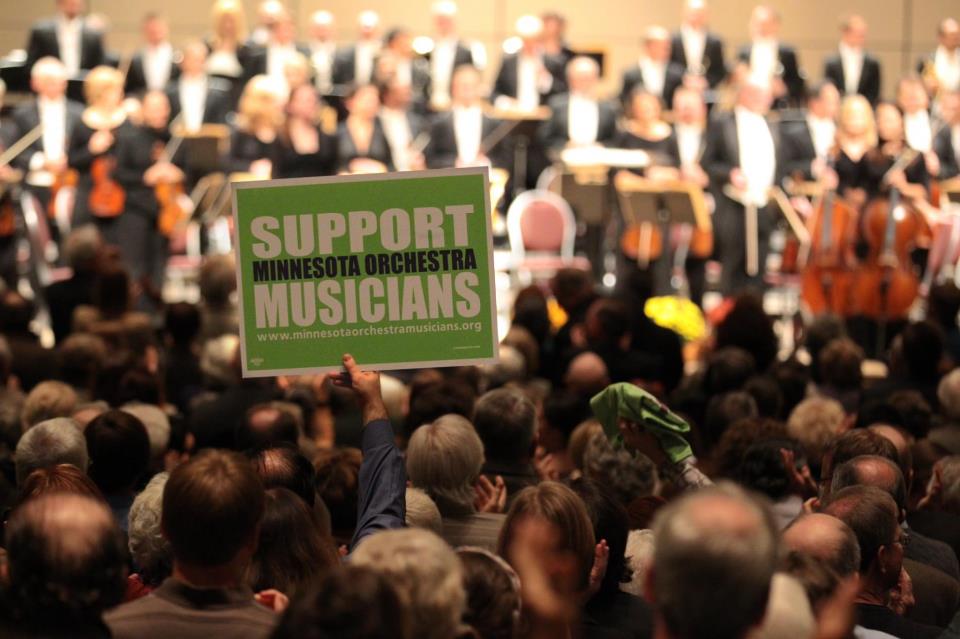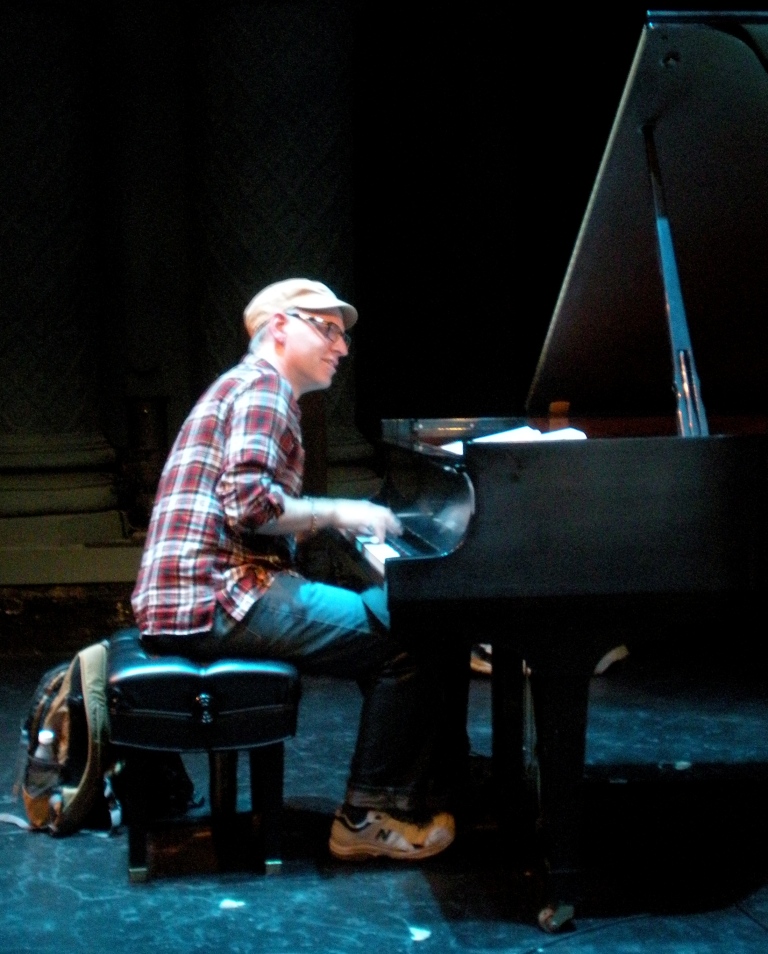Scabs
Composer and pianist Jeremy Walker weighs in on the MN Orchestra and SPCO lockouts: the hotly contested issues of pay for professional musicians, spendy capital campaigns and what we all stand to lose if the concert halls stay silent much longer.




I LOVE CLASSICAL MUSIC, to the point that I am one of those people who chafes at use of the general category “classical” to describe it. I have been the boring guy at parties who points out that to place all orchestral music, piano music, opera, and chamber music for 400 plus years in the same category is a diminishment to the music and its composers and performers.
But I love classical music.
That’s not to say there’s no tension. Jazz and classical music may occupy the same territory — non-popular, serious music — in the broader culture, but their practitioners live on hugely different pay scales. Take two equally accomplished musicians, one a jazz musician and the other, say, second violin in a professional orchestra; those artists don’t occupy the same socio-economic strata —not even close. Both have a achieved a high level of mastery of their instruments, with a possible difference being that the former also needs to have fluency in his form on a compositional/improvisational level. In other words, the highly accomplished jazz musician, unlike her orchestral counterpart, is at once performer and a composer when she’s playing.
A similarly wide gap in pay exists at the highest strata of both musical fields. What a brilliant, well-known master of jazz, such as Joe Lovano or Benny Golson, can command in fees is so much less than someone at the top of their craft in classical music, like Andres Schiff or Itzhak Perlman. The comparison isn’t so much economically disheartening as bewildering.
It’s not fair, certainly, but I don’t bring these inequities up to complain or demand that someone rectify the situation. Economic life is rarely fair, and being a jazz musician has other compensations. I also want to state clearly: I’m not arguing that classical musicians, at any level, should be making less money. Outside the sphere of professional orchestras, there plenty of great classical musicians piecing together a living from teaching, wedding gigs, and pocket lint like the rest of us. Also, less money for classical musicians wouldn’t mean jazz musicians could suddenly make more. I am not some anti-cultural populist with buried Marxist leanings masking a grudge as fairness.
I bring up this tension around pay between jazz and classical players to clear the air and set some context for the topic I’d like to hit in this month’s column – namely, the lock-outs going on at Minnesota Orchestra and the St. Paul Chamber Orchestra (SPCO). Considering the income disparity mentioned above — not to mention the fact that even outside the field of music, those playing in both orchestras occupy the higher economic sectors of society — it would be easy to take the position they should all just tighten their belts and experience recession America post-9/11.
Like many people here, I grew up with the orchestras as a given. We lived in the Twin Cities, and it seemed only fitting that our twin cities should likewise have two world-class orchestras. My first concert was at Orchestra Hall when it was still new and shiny. It was a young person’s concert — they played Peer Gynt — and it was thrilling. I remember very little about the hall itself (other than the ceiling cubes), but I do remember the sound of that orchestra. I spent many weekends in college rushing both Minnesota Orchestra and St. Paul Chamber Orchestra. I heard the SPCO play Brandenburg Concertos (with harpsichord, which seemed exotic at the time) and Stravinsky, Beethoven and Hayden. I heard symphonies, tone poems, and concertos. I distinctly remember the wonderful Manny Laureano playing the trumpet lead in Copland’s Quiet City. There’ve been so many memorable nights and performances from both orchestras since — at least until the lock-outs this fall.
Certainly, run of the mill strike issues are always part of these situations, but a simple narrative of greed or financial mismanagement just doesn’t cover things here. Somewhere it seems we all lost our way. The problems facing classical music are the same as those facing all the performing arts. Patronage (particularly for individual artists), in the form of both grants and gifts, is down across the board. Some say noblesse oblige is dead, and a few minutes hanging out on Wall Street or Soho suggest that that might just be true.
I want to stay focused here. It would be so easy to get off on a tangent rant about The Voice, X Factor, American Idol, The Country Music Association awards, contemporary Broadway, 3D movies, pirated music and draconian cuts in music education, to say nothing about the chasm in quality television programming separating The Office (American) from M.A.S.H., and all the rest. (I’m sure it’s part of the same problem, actually, but for this article, maybe beside the point.)
______________________________________________________
Simply put: We don’t value what has value anymore. If even populists of all political stripes can swallow multimillion dollar salaries for professional athletes while getting hot and bothered over $120,000 for a violinist — who have we become?
______________________________________________________
Simply put: We don’t value what has value anymore. That is what the lock-outs reveal. Now, I am not fully up on all the details of these disputes. (If you’re interested, you can find the orchestra managements’ perspectives here and here; the musicians have their own websites too, here and here.) But when you’re talking about a $52 million capital expenditure for renovations to Orchestra Hall while substantially cutting pay for musicians, something has gone out of whack. The hall is for music, right? Who plays it? Ok, maybe other people could play it for less. But given the fact that both orchestras were ready to come to the table to talk about pay cuts (especially those playing in the SPCO), why was management for both so ready to accept a lock-out as the best course for negotiation?
I think a big part of this is we have come to have no confidence in the music; we’re assuming people won’t come just to hear musicians play. Maybe they’ll come for the building, get interested in the organization because interesting architectural monuments are built — it is the capital campaign as marketing blitz. We see that thinking everywhere: the Cowles Center, the new Walker, the new Guthrie, the once-and-soon-to-be-again-new Ordway. Target Field is a sleight of hand, a stadium so beautiful maybe we won’t notice the ugliness of our team’s record. And now on to the Vikings…
So, the deeper issue I see is: What the hell is wrong with us? I love great buildings and well-designed spaces, but not when they get in the way of their very reason for being. It seems to me Minnesota Orchestra is now not playing, in part, because a new space is being funded for them to play in. A building helped take down Jeune Lune. Why do these edifices for performance make bigger news than the work happening inside them?
And make no mistake: That work, the music, is where it’s at. There is no architectural sleight of hand going on with SPCO and Minnesota Orchestra. These are world class artists, making music at the highest level. So, if management, however misguided it may be, feels it has to build a new space, as in the case of Minnesota Orchestra, or drastically discount tickets and cut salaries, as in the case of SPCO — what does that say about us? If a city can support endeavors as expensive as football and baseball, and if even populists of all political stripes can swallow multimillion dollar salaries for professional athletes while getting hot and bothered over $120,000 for a violinist — who have we become?
I’d argue that the musicians have already shown great willingness to adapt to new economic realities. We all know endowments, grants and gifts are down. Minnesota Orchestra and SPCO players were ready to come to the table. So, money isn’t the whole story here. Is the lock-out a statement that musicians, really top-notch musicians, just don’t matter?
It is so easy to get used to living without something. Baseball is still dealing with the fallout from its strike in 1994. The playing stops and audiences move on, and then something is gone forever. The thing is: These two orchestras are an integral part of our cultural fabric. Without them, what are the Twin Cities? Target’s corporate campus? A city is made up of these identifiers. And if we lose them, it must ultimately be because we just didn’t value them. If the SPCO can no longer make the majestic sound it’s become known the world over for, then St. Paul moves a little closer to becoming a cheerless government administration building, writ large.
I had grand plans for this article, but reading over it, I see I’m mostly left with impressions and questions. I don’t have answers, but fortunately there is some good news out there. It’s become typical, in all the bad news about civic arts support, to hear about ever-declining audiences, decreasing public interest in classical music. But recent concerts by the Musicians of the St. Paul Chamber Orchestra and the Musicians of the Minnesota Orchestra suggest otherwise. Audiences are coming out to hear these accomplished musicians. No new halls, no slick marketing campaigns — just music. All those people coming out to hear them play in area churches and ad hoc concert halls say loudly: We need to be able to hear live music played by the best musicians. That message better be falling on ears ready to hear it.
______________________________________________________
About the author: Jeremy Walker is a composer/pianist based in Minneapolis. He has performed with Matt Wilson, Vincent Gardner, Wessell Anderson, Marcus Printup, Ted Nash, Anthony Cox, and other notable musicians. Jeremy was the owner of the now defunct club, Brilliant Corners and co-founder of Jazz is NOW!. Walker teaches piano at K and S Concervatory in Woodbury, MN. He is composing the score for the upcoming documentary Photographic Justice: The Corky Lee Story.
You can hear Walker play at the Artist’s Quarter with his band Boot Camp on December 26th and with trumpeter Kelly Rossum at Dakota Late Night on January 5th.